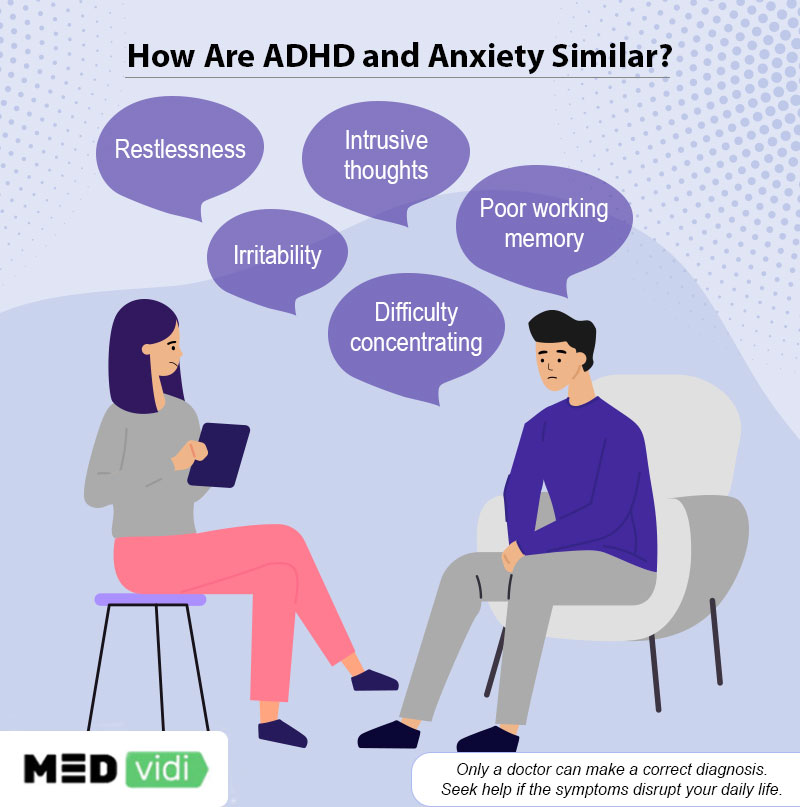ADHD (attention deficit hyperactivity disorder) and anxiety are separate conditions. However, sometimes they may occur together, and a
Often, ADHD begins during childhood, and those affected may fidget, have short attention spans, and become impulsive, hyperactive, and restless, as well as have other related symptoms. ADHD may continue in adulthood, and people face other daily challenges, such as inattention when studying, missing work deadlines and worrying about that, constant stress, and anxiety.
Researchers haven’t defined the exact causes of ADHD and anxiety disorders appearing together. There is the possibility that factors causing ADHD, like premature birth, genetics, and environmental toxins, could also play a role in that. In this post, we provide a general review of the connection between these conditions, their common and different symptoms, and ways to manage them.
If you experience any of the above-mentioned symptoms and they make your life challenging, consider consulting a medical professional.
Can ADHD Cause Anxiety?
Often, ADHD is hard to tell apart from anxiety disorder since people with ADHD or anxiety share some symptoms. For instance, individuals affected by either condition may exhibit similar symptoms, such as difficulty relaxing, trouble concentrating, and inattentiveness, although the underlying causes of these symptoms may differ.
Learning about both conditions and getting a proper diagnosis is vital; however, learning how they are interconnected is also critical.
An adult with ADHD can experience a worsened anxiety disorder because of the condition’s impact on brain chemistry. Brains of people experiencing ADHD with anxiety tend to have trouble making sufficient levels of serotonin and dopamine consistently. Often, their serotonin and dopamine levels are too low or high, leading to:
- Depression
- Anger issues
- Irritability
- Mania
- Impulsivity
ADHD medications, especially stimulant medications like amphetamines (Adderall), could also cause anxiety as a side effect or exacerbate anxiety symptoms. If anxiety persists over time, doctors might consider switching the patient to non-stimulant medications like viloxazine (Qelbree).
ADHD Symptoms That Can Worsen Anxiety Disorders
Now that we know that there is a link between ADHD and anxiety disorder in adults, affected individuals may be asking themselves if ADHD could be worsening their anxiety. Simply put, it is possible.
For instance, individuals may feel overwhelmed, restless, experience memory issues, or have trouble concentrating, leading to heightened anxiety. ADHD can also make it difficult for individuals to make difficult or critical decisions leading to increased anxiety. Additionally, perfectionists who have ADHD may develop anxiety if their ADHD prevents them from achieving their standards. In addition, ADHD affects the part of the brain responsible for emotional regulation, which may cause the affected individual to experience anxiety.
The best solution to reduce such symptoms is to use various strategies for ADHD management, including detailed planning, scheduling tasks, removing distractions, and leading a healthy lifestyle.
MEDvidi doctors will examine your health history and current symptoms in detail to offer the most suitable treatment.
Similarities Between ADHD and Anxiety
ADHD and anxiety have similarities in both physical manifestations and mental symptoms. These include:
- Low levels of GABA (gamma-aminobutyric acid), a neurotransmitter regulating neuronal activity.
- Sympathetic nervous system dominance, causing the body’s fight or flight response to be more active.
- Sleep issues.
- Fatigue or getting tired easily.
- Intrusive thoughts.
- Difficulty concentrating.
- Poor working memory.
- Muscle tension.
- Restlessness.
- Irritability.
Still, despite some similar signs, ADHD and anxiety are two distinct disorders with different specific symptoms. Thus, monitoring your state — for example, with the help of an online ADHD test — can be helpful in checking for ADHD indicators. However, if you have any bothersome symptoms, it’s essential to seek professional advice and get proper treatment.

How to Treat ADHD and Anxiety
Treating individuals having both ADHD and anxiety is challenging since ADHD medication may worsen anxiety symptoms. Often, physicians employ new strategies to treat the conditions simultaneously and make individualized treatment plans. Several treatment options include medication, lifestyle changes, therapy & relaxation techniques.
However, treating one condition before the other may also be beneficial. The order of treatment should be based on the order in which the disorders developed. For instance, if the patient’s ADHD is the cause of their anxiety, it may be helpful to treat ADHD first using cognitive behavioral therapy (CBT) and/or medications, followed by a reassessment of anxiety symptoms.
Get an effective individualized treatment plan for ADHD or anxiety disorders online.
How Emotional Regulation Can Help
Emotional regulation helps individuals with ADHD and social anxiety to avoid emotional outbursts during difficult situations. It allows such individuals to respond more calmly and find clarity during stressful events. Emotional regulation is effective and can produce positive results when paired with other forms of treatment. Its techniques include:
- Identifying emotions.
- Improving physical health to impact emotional health positively.
- Learning coping strategies to control emotions.
- Staying grounded e.g. with the help of meditation.
- Questioning unhelpful thoughts that trigger negative emotions.
- Doing uplifting activities.
- Distancing from emotionally challenging situations.
Conclusion
ADHD and anxiety are distinct conditions with different symptoms. However, the symptoms can overlap at times. Individuals with anxiety and ADHD struggle to perform daily activities and hold long-term jobs. They may find it difficult to concentrate on daily tasks and should get proper treatment to improve their quality of life.
The great news is that both conditions are highly manageable. Individuals should consider talking to mental health professionals to help them differentiate the conditions and create an effective treatment plan.













